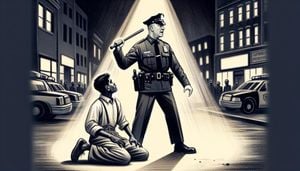Far-right British politician Nigel Farage recently made waves with his remarks about the upcoming U.S. presidential election, particularly concerning his close friend, former President Donald Trump. Farage expressed his belief during interviews and public speeches, advocating for Vice President Kamala Harris to pardon Trump if she wins the election.
His rationale? To "dampen down" potential tensions and civil unrest. This idea isn't coming out of left field, particularly with the echoes of the January 6th Capitol riot still hanging over the political discourse. Farage noted, "If she wins on Tuesday, I hope she pardons him. She could look magnanimous and it would dampen down potential tensions."
This statement was particularly provocative, as it suggested not just forgiveness for past actions but diminutive leadership from Trump, whom he suggested should concede decisively if he loses, and even take up golfing instead of contesting the results.
Indeed, Trump's legal troubles looms large as he faces sentencing later this month for 34 counts of falsifying business documents, linked to payments made to adult film actress Stormy Daniels just before the 2016 election. Trump's predicament adds another layer of complexity to the election atmosphere. Farage's request for a pardon seems oddly timed, almost as if to offer Trump some grace before the politically charged election results.
Farage, who has vocalized his grievances about perceived election interference by the Labor Party back home, feels this pardon could serve as both peacekeeping and could project strength if Harris moves to secure her presidency by showing mercy. Washington, meanwhile, is gearing up for potential unrest, with barricades and additional security already being implemented around key governmental buildings as election day approaches.
Capital fortifications were evident even before the election; eight-foot-high fences were put up around the White House and barring entry to the Capitol, signaling serious concerns about possible civil unrest regardless of the electoral outcome. These measures serve as both a practical approach to threat management and symbolic reflection of the growing division within American politics.
Polls indicate Harris and Trump are neck and neck, making the stakes extraordinarily high and leaving room for speculation about the behavior and decisions of both camps post-election. Farage's suggestions seem to anticipate not just the legal aftermath for Trump, but the social ramifications if the election does not go his way.
"If it was clear and decisive then maybe it's time for Trump to go play golf at Turnberry," Farage remarked, advocating for acceptance rather than the tumultuous accusations of fraud he made after the 2020 election. For Farage, it appears the point is not just about Trump, but about prolonging unrest and preventing the political climate from spiraling out of control as it did previously.
On the flip side of this, Harris has framed her campaign around the notion of unity and bringing the country together, urging Americans to “turn the page” on the politics of division. The calls for inclusion and collective progress starkly juxtapose the sentiments expressed by Trump, who has maintained narratives of suspicion against the electoral processes and diverse blockades against his competitors.
Farage's comments reflect broader anxieties not just within the United States but across global politics. His insistence on the significance of U.S.-U.K. relations hints at his apprehension about what a second Trump term might mean for Britain, particularly when drawing on economic agreements and geopolitical stability.
His connection to Trump is well known and has been the subject of scrutiny; after all, his trips across the Atlantic have featured hefty expenditure recorded from private donations, raising questions about his political motivations. "I travel frequently to show support for Trump, who I believe is corrected about his stance on U.S.-U.K. relations. These are our real friends, and maximizing those opportunities is my goal," said Farage, justifying his political engagements.
Though Farage remains optimistic about Trump's chances, his sentiments cast doubt against Harris’ aspirations, building the tension leading to this remarkable election period. The British MP, managing expectations, recognizes the unpredictable nature of electoral outcomes and has indicated he does not entirely discount the possibility of Biden’s challenger returning to the Oval Office.
Both markets and media outlets are brimming with speculation about the presidential candidates’ future. Trump’s self-proclaimed confidence seems unshaken, yet public sentiments largely dictate the narrative leading up to election day, showcasing divided opinions shaped by previous events.
Weeks leading to the election, Harris remains poised to be President “for all Americans,” she stated, leading efforts to rally voters and consolidate support among key demographic groups. Her campaign aims to break the cycles of animosity and distrust characterizing previous interactions between the parties.
All these elements converge as America braces for what could be a historically significant event, with both domestic and international contingencies potential reflected within the outcomes of the ballots. A Harris presidency would reshape strategies and redefine ties distinctively influential not just for America but for broader international relations.
Post-election, whether Trump faces rehabilitation through Harris’ hypothetical pardon or retaliation via criminal trials remains at the forefront of discussions. Farage’s meddling stance, echoing calls for acceptance rather than hostility, seeks to curb friction, aiming for political stability over chaos.
Simultaneously, the complexity surrounding claims of election integrity and integrity itself doesn’t conclude with Harris or Trump alone but begs engaging with larger questions about how democracy and governance evolve. With everything hanging on such key moments, how each individual chooses to navigate potential outcomes will significantly influence both political and civil landscapes.



